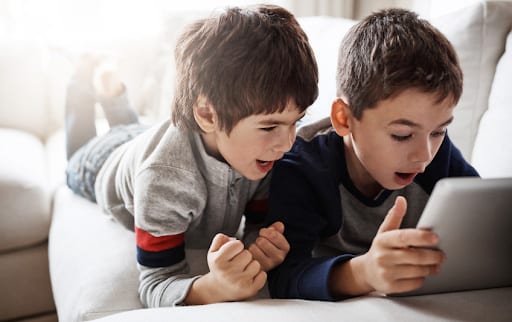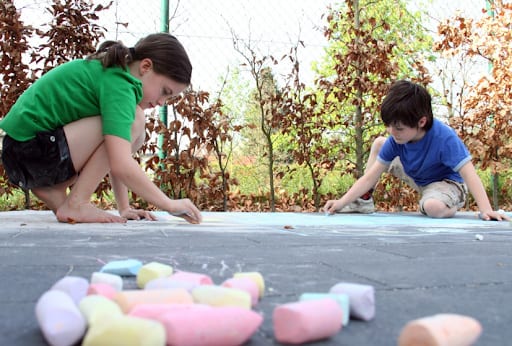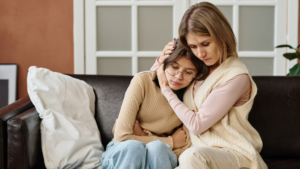If you are a parent like me, you are always looking for ways on how to limit screen time with your kids. You are asking yourself, “How do I keep my child off the screen?” and “How do you stop screen time without struggle?” Well, I have the answers to your questions!I know you worry about the effect of screen time on your kid’s brain, social skills, and body and guess what you should be! You are probably searching for the right screen time recommendations by age because you are worried about the ever increasing amount your kid is spending on their device.
How to Break the Screen Time Habit:
1) Have Structure and Routine About Screen Time
Kids of all ages crave predictability and that is what structure and routine creates. When our children and teens know what the daily routine is, it helps to give them control and comfort. And when kids feel like they are in control, it reduces worry and friction with their parents.
2) Have Clear, Consistent Limits About Screen Time
A lack of clear, consistent technology limits BEFORE a kid gets on their device is the number one source of screen time battles. Sounds so simple, right? Well, we lead busy lives as it’s easy to get inconsistent and start giving our kids too much screen time. Then we feel irritated when they are on it too much. From a brain perspective, when you are incinisustet, your kid is unlearning the rules. Yep. That is why clear, consistent limits are so critical.
3) Use Technology to Limit Screen Time
There isn’t a family on the planet that shouldn’t be using technology to limit a kids screen time. I use technology and a proxy server that gives my kids a certain amount of WiFi for the day and my kids have to budget their time. They know, when their WiFi is out, it’s out! The only way they can earn more time is by doing physical chores. Adding this one piece of technology has cut our screen time usage battles by at least 80 percent!
4) Get Kids Moving and Off Their Devices
Get your kids butts out of their seats! Technology is not only addictive, but all of that sitting is hard on our brain and body. There is an effect of screen time on the brain and body. Kids get “tech necks” from being hunched over their devices and that leads to reduced blood flow to the brain and more specifically the frontal lobes. Reduced blood flow to the frontal lobes causes poor focus, difficulty learning, and trouble transitioning. Movement is the antidote to too much screen time. You want to make it part of your kids daily routine, so you don’t battle over that too!
5) Have Another Activity Ready Instead of a Device
Do you find yourself saying, “When I was a kid, we were on our bikes till it was dark out!” I hear you BUT our kids aren’t playing in the same way we were. They don’t have the same kind of autonomy we did to be independent either. And the reality is technology is here to style so let’s work with it instead of fighting it. Ultimately, kids go to their devices first and they aren’t conditioned to reach for other activities in the same way. They can, however, learn to independently use non-tech activities on their own. You just need to set up their environment, so they have ready access to things they like to do. Maybe it is having art supplies or Legos ready? My recommendation is to have a list of activities they can do next to their work station, so you don’t have to constantly be the cruise director managing bored passengers.
6) Quality of Technology Matters
We know through research that there is a difference in the type of screen usage and it has a BIG impact on the mental health of children and teens. Kids who are “passively scrolling” are much more likely to experience generalized anxiety, social anxiety and depression. Passive scrolling is when kids are just watching YouTube and netflix and not engaging with peers online. Research tells us that when kids engage with others online with technology such as facetime, group chats, using Discord, or gaming together, there is actually a positive mental health benefit. The lesson here is there is a difference in their mental health in how your kids are spending their time on technology so make their usage count.
7) Role Model Technology Usage
This may be your biggest challenge, moderating your own screen time usage in front of your kids. The boundaries between work and personal usage on our devices are blurred and just like our kids we can find ourselves spending too much time scrolling or working. It is important to role model for your kids, healthy usage, physical activity, stress management techniques such as neurofeedback and biofeedback, and just like you are asking your kids – time off your device.
8) Schedule Screen Free Time
The whole family needs a period every day without screen time. That can be at meals, an hour during the day, or whenever you think it works for your family. You just need to be consistent about it and give clear warnings. Remember, our kids need consistency and when we break from it, they unlearn the work you just did.
9) Talk, Don’t Yell When Limiting Screen Time
Boy it is frustrating trying to get those kids off their devices. I have been there too, especially before I began using technology to limit their WiFi usage. Like every good relationship, healthy communication is key to managing expectations and actually “hearing” each other. When we yell, not only do we get ramped up, our kids actually don’t hear what we are saying. Stick to those screen time limits and be clear and consistent and you just won’t have to yell so much. When you or your kid are frustrated, try not to have big conversations with them and table them when you are cooled off. Find out why being on their device at that time was so important. It is important to hear your kids out and also let them know why it is important for them to be doing something else too.
10) Stop the Mom Guilt About Screen Time
Love it or hate it, technology is here to stay. A lot of parents feel so guilty because kids today spend a lot of time on their devices when we didn’t as kids. Well, we just didn’t have such cool technology that was designed to be so engaging. And not all technology is bad. Like everything else in life, it is all about balance.
Looking for more tips on healthy media usage, check out my blog, 14 Tips on Healthy Media Usage.
Are you looking for help for your child’s or teen’s behavior?
Boy, the world is stressful right now (and it has been for a long time!). Of course, you are worried about your child’s stress level! You are searching for solutions that can help your kid. You want to see them SUCCEED and be confident. Your child may be struggling with focus, stress, mood, behavior, emotions, or socially and you aren’t sure what to do about it and you feel STUCK… You are looking for solutions to help your kid with ADHD, anxiety, mood, learning, and other issues. Well, Dr. Roseann is here to show you how to GET UNSTUCK and cultivate success in small and big ways!
As a licensed therapist and certified psychologist, as well as a special needs mom herself, Dr. Roseann knows what it is like to search for ways to help your child’s attention, learning, and behavior and still see your child struggle. So, if you’ve gone down the Google MD and ineffective medication and therapy rabbit hole, it is time to get support from Dr. Ro who can help you help your child to be focused, calm, and feel good about themselves.
Want to work with Dr. Roseann, so you can turn your child’s behavior around and GET UNSTUCK and CULTIVATE SUCCESS?
Join our Raising Successful Kids Community, where you get Dr. Roseann trademarked solutions to helping your child with ADHD, anxiety, depression, OCD, autism, PANS/PANDAS, learning disability, concussion, behavioral issues, or whatever is going on with them regardless of your kid’s age or ability. For less than $1 a day, you get Dr. Ro, the foremost expert in the world on children’s mental health in your back pocket! Join a community of like-minded parents and get the secret sauce to cultivating confidence, independence, and success in your child in only the way that Dr. Ro can do!
You can get her books for parents and professionals, including: It’s Gonna Be OK™: Proven Ways to Improve Your Child’s Mental Health, Teletherapy Toolkit™ and Brain Under Attack: A Resource For Parents and Caregivers of Children With PANS, PANDAS, and Autoimmune Encephalopathy.
Want to work with Dr. Roseann personally? She sees people at her Ridgefield, CT center using neurofeedback, biofeedback, and psychotherapy to turn behavior around, as well as does neurofeedback and coaching remotely. She has also reached billions through her dozens of media appearances on her mission to, “Change the way we view and treat children’s mental health™.”
The best way to find out if we can help you is to apply to work with us, so we know you are ready for the powerful change that lies ahead.
Are you a professional who wants more training from Dr. Roseann?
Sign up for her Professional Webinars and CE-Based Courses or purchase her book, Teletherapy Toolkit™: Therapist Handbook for Treating Children and Teens.
If you are a business or organization that needs proactive guidance to support employee mental health or an organization looking for a brand representative, check out Dr. Roseann’s professional speaking page to see how we can work together.
Dr. Roseann is a Children’s Mental Health Expert and Therapist who has been featured in/on hundreds of media outlets including, CBS, NBC, FOX News, PIX11 NYC, The New York Times, The Washington Post,, Business Insider, USA Today, CNET, Marth Stewart, and PARENTS. FORBES called her, “A thought leader in children’s mental health.”
She is the founder and director of The Global Institute of Children’s Mental Health and Dr. Roseann Capanna-Hodge. Dr. Roseann is a Board Certified Neurofeedback (BCN) Practitioner, a Board Member of the Northeast Region Biofeedback Society (NRBS), Certified Integrative Medicine Mental Health Provider (CMHIMP) and an Amen Clinic Certified Brain Health Coach. She is also a member of The International Lyme Disease and Associated Disease Society (ILADS), The American Psychological Association (APA), Anxiety and Depression Association of America (ADAA) National Association of School Psychologists (NASP), International OCD Foundation (IOCDF) International Society for Neurofeedback and Research (ISNR) and The Association of Applied Psychophysiology and Biofeedback (AAPB).
© Roseann-Capanna-Hodge, LLC 2021












